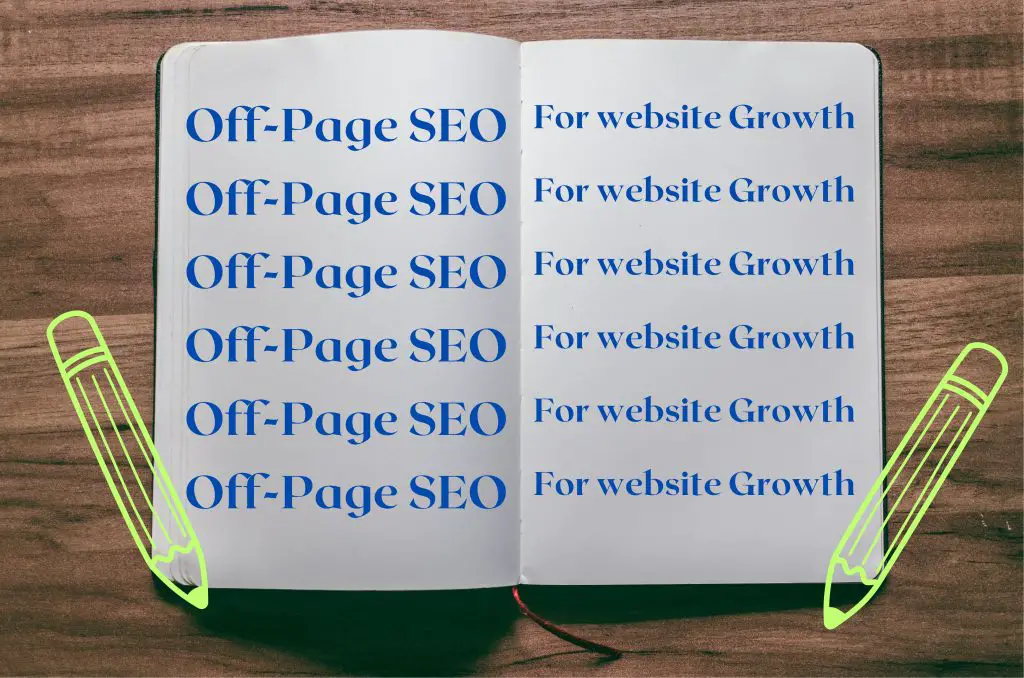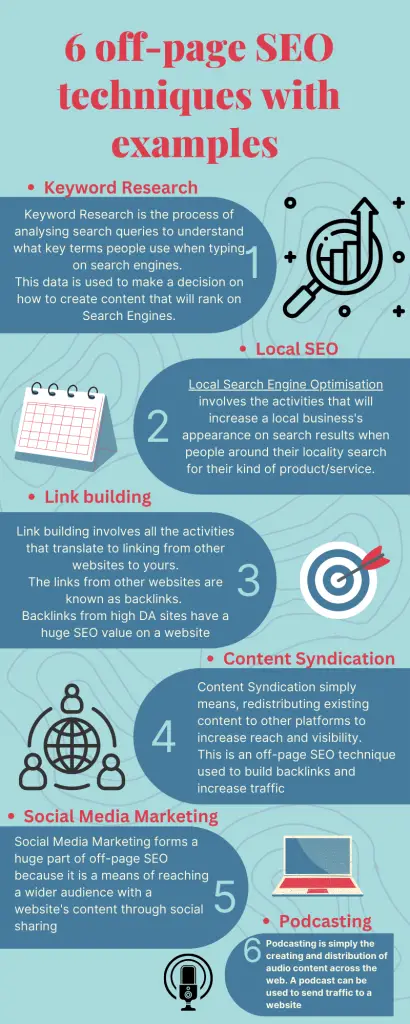In this blog post, you will learn about the best Off-page SEO tools that would help you skyrocket your website traffic.
If you read till the end you will;
- Realise the main reason for off-page SEO and why you should make it a priority.
- Discover key examples of off-page SEO.
- Discover the “Must have” off-page SEO tools and their use cases.

Off-page SEO refers to activities carried out outside of a website to improve its ranking on Search Engine Result Pages (SERPs). These include keyword research, social media marketing, guest posting, content syndication etc.
What is the main purpose of off-page SEO?
The main purpose of off-page SEO is to improve your website’s visibility on search engines.
Off-page SEO helps to increase your website’s reputation online, this translates to having a trusted site with valuable content and high Domain Authority (DA), improving the website’s overall image online.
Without good off-page Search Engine Optimisation, your website will most likely struggle to rank.
This can negatively impact your traffic and income.
But with a good SEO strategy in place, you can be sure of a website that will rank on Search Engines for certain keywords, attract organic traffic and backlinks, and generate the desired outcome, which (for most online businesses) is to make more money.
What are examples of off-page SEO?
Off-page SEO includes (but is not restricted to) the following:
- Keyword Research
- Local SEO/local listing
- Guest posting for link building
- Content Syndication
- Social media marketing
- Podcasting

7 Must-have Off-page SEO Tools
The under-listed off-page SEO tools have been carefully hand-picked to help boost your SEO Strategy;
1. Google Keyword Planner
Although Google keyword planner is intended to help paid advertisers find relevant keywords to target with Google ads, however, its features also support SEO keyword research because you can use this tool to check keyword volume (among other things).
If you do not have the budget to pay for premium keyword research tools, Google keyword planner is a good place to start your off-page SEO journey.
Understandably, Google Keyword Planner does not support in-depth analysis with detailed data to make informed decisions regarding SEO content writing or link building, but it is a free and budget-friendly off-page SEO tool for beginners.
2. Ubersuggest
This is an alternative to Google Keyword Planner. Ubersuggest is a low-budget SEO tool that heavily supports off-page SEO.
I have used ubersuggest for a long time (since it was launched) and it has been serving my business so well considering its pricing (compared to SEMrush and Ahrefs).
As an SEO Consultant, I combine ubersuggest with other more sophisticated tools, but if you are a beginner with little or no budget, stick with ubersuggest (and Google Keyword Planner).
Key features/Benefits of Ubersuggest for off-page SEO
- Keyword Research
- Keyword Tracking
- Backlink Monitoring
- Competitive Analysis
- And overall SEO management
Ubersuggest has features that support technical SEO and on-page SEO, e.g. site audit, AI Content writing and headline generator tool etc.
3. Answer the Public
Ubersuggest and Answer the Public are tools owned by Niel Patel.
Just like Ubersuggest, Answer The Public gives an in-depth understanding of what people are searching for on Google.
I look at this tool as a “mind reader” because it helps you to read the minds of searchers.
If you can understand the mind of searchers, you can easily create content that will meet their needs and answer their questions.
Key Features/Benefits of Answer the Public
- You can discover search queries and measure by search volumes
- You can create a search alert and be alerted when a new search query is trending
- It reveals long-tail keywords
- It provides a robust list of content ideas
- It allows you to download the content ideas as CSV files.
4. Hemingway Editor
The Hemingway app has become increasingly popular for its ability to make SEO content writing simple, clear and bold.
Hemingway Editor is an off-page SEO tool because it makes content preparation easy outside the website (this qualifies it to be an off-page SEO tool).
Look at the Hemingway editor as an all-in-one proofreading solution.
Features/Benefits of Hemingway Editor
- The Hemingway app highlights complete wordy sentences and suggests new words and phrases for easy comprehension by the reader.
- It makes proofreading seamless
- It helps bloggers and SEO content writers to create clear, accurate and comprehensive articles off-page before transferring them to their website for publishing.
Hemingway editor has an online (free) editor and a downloader desktop (premium) app.
5. Grammarly
Over 30 million people use Grammarly worldwide, this is very evident because the tool has become a household name when it comes to content writing support, however, it is the most undermentioned SEO content writing tool.
Although Grammarly Chrome Extension supports on-page content creation, the Grammarly web app can be used as a guided tool to create plagiarism and error-free content “off-page”.
If you want to become an SEO content writer of good repute, then arm yourself with Grammarly as it does not only support on-page and off-page SEO strategy, it goes the extra mile to help you feel confident when writing.
Key Features/Benefits of Grammarly
- It helps to quickly identify typos and confusing statements and then provides corrections and recommendations to ensure that your writing is error-free and polished.
- It helps to guide your tone and mode of writing so that you can create a better impression without changing your meaning.
- It nicely provides “clarity” suggestions to make your writing enjoyable be your readers.
6. QuillBot
Quillbot is a paraphrasing tool that can quickly increase your off-page content creation speed. If you have been hit by “writer’s block”, and you need to make progress with your writing regardless, Quillbot can help you achieve that by paraphrasing existing content into new, unique and error-free content.
According to SimilarWeb, QuillBot has over 68.8 million visits worldwide, with 68.49% direct traffic, meaning the website/app is widely trusted, visited and used by a lot of content creators, bloggers, as well as students/academics etc.
Key Features Features/Benefits of Quillbot
- QuillBot paraphrases your text by refining it to something unique without changing the meaning.
- It serves as a grammar checker
- It summarises a lengthy article/news to a short/concise article containing the key points and maintaining the meaning of the original article.
- It generates academic citations in either APA, MLA and Chicago style.
This tool is more useful to content writers who want to spin existing content to create new content.
If used correctly, it can boost your off-page SEO strategy.
7. Talkwalker Alerts
Talkwalker is also a great tool for Off-page SEO.
Its key use case is to monitor your brand, website or keyword mentions online.
How can this tool support your off-page SEO strategy?
Since it supports social listening, you can easily have an insight into what people are talking about your brand, website or the key phrases associated with your content or business. This eventually informs your content creation.
Apart from using Talkwalker to gauge customer experience (satisfaction or dissatisfaction), as a website owner, you can use it to do trend analyses to realise what is working and double your efforts to scale.
Similarly, if you realise where your brand or website-related keywords are mentioned, it becomes easy to pursue link-building opportunities.
TalkWalker is a free alternative to Google alerts.
Key Features/Benefits of Talkwalker
- It reveals negative customer reviews about your brand and its products.
- It helps you to uncover hot and trending topics about your brand or website, translating into link-building opportunities
- It reveals information about your industry of interest
- And so on.
Key Takeaways
Off-page SEO is key and can be a huge contributor to a website’s ranking. The following free tools are very essential in supporting your off-page SEO strategy
- Google keyword planner
- Ubersuggest
- Talkwalker
- QuillBot
- Grammarly
- Hemingway editor
- Answer the Public
FAQs About Off-Page SEO
What is the difference between on-page and off-page SEO?
On-page SEO refers to activities carried out on a website to optimise content for search ranking. If done the right way, On-page SEO can be a major ranking factor for a website.
Off-page SEO on the other hand refers to activities done outside a website to improve its visibility or ranking on Search Engine Result Pages (SERPs). These include, but are not limited to; keyword research, social media marketing, link building etc.
Is off-page SEO better than on-page SEO?
No, they are equally important. You can’t do without any if you want to get the correct result. They are two edges of a sword that cannot be separated.
For instance, keyword research (an off-page SEO activity) is carried out to create SEO-optimised content (an on-page SEO activity).
Can we get ranking through off-page SEO?
A website’s ranking can increase through off-page SEO. However, it is not all that is needed to be done. On-page SEO and technical SEO are also needed. Off-page SEO remains very significant regardless.
